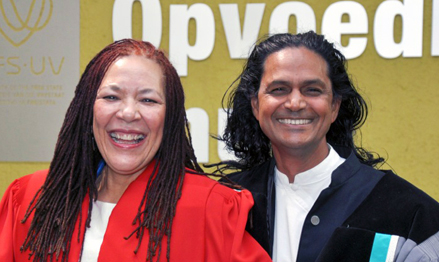Latest News Archive
Please select Category, Year, and then Month to display items
12 December 2024
|
Story Lacea Loader
|
Photo Supplied
 Dr Cias Tsotetsi, newly appointed Campus Vice-Principal: Academic and Research on the UFS Qwaqwa Campus.
Dr Cias Tsotetsi, newly appointed Campus Vice-Principal: Academic and Research on the UFS Qwaqwa Campus.
The University of the Free State (UFS) is pleased to announce the appointment of Dr Cias Tsotetsi as the Campus Vice-Principal: Academic and Research on the UFS Qwaqwa Campus as from 1 January 2025.
He is currently Senior Lecturer and Assistant Dean in the Faculty of Education on the UFS Qwaqwa Campus. He holds the following qualifications: BEd(Hons), Postgraduate Diploma in Education, Magister Educationis with specialisation in Policy Studies and Governance in Education, and PhD with specialisation in Philosophy and Policy Studies in Education – all from the UFS.
Dr Tsotetsi operated in the school environment for about 24 years before joining this university in 2010. Since then, he has taught several modules in the Faculty of Education and published several co-authored research articles as well as conference papers on community engagement, teacher development, and participatory action research methodologies, among others. He is also well versed in supervising postgraduate students.
He has received awards from both the university’s Scholarship of Teaching and Learning and the Research committees for his research and academic scholastic performance. He is a member of various committees, such as the Faculty of Education Academic Advisory Board and the Committee for Title Registration and has been participating in partnerships and in NRF-funded projects with peers from universities such as the University of KwaZulu-Natal, the University of Zululand, the Durban University of Technology, and the University of Venda.
“Dr Tsotetsi has a clear understanding of the current systems and operations on the Qwaqwa Campus and is positioned to drive its development. His experience and initiatives involving staff and postgraduate students are exceptional and inspiring. We look forward to Dr Tsotetsi’s valuable contribution to the UFS Qwaqwa Campus and the institution in his new position,” says Prof Prince Ngobeni, Campus Principal of the Qwaqwa Campus.
“I feel honoured to serve the university – and the Qwaqwa Campus in particular – and look forward to working with the campus and its management to develop the research portfolio,” says Dr Tsotetsi.
Rhodes professor calls for accountability in teacher education
2013-11-14
|
 |
Prof Jean Baxen of Rhodes University and Prof Dennis Francis, Dean of the Faculty of Education of the UFS.
Photo: Stephen Collett
15 November 2013 |
Lecture (pdf)
“Our education system needs quality teacher education.”
This was the message from Prof Jean Baxen, Deputy Dean of Research at Rhodes University in Grahamstown. She delivered the Education Public Lecture on ‘The lives of children, citizenship and teacher education: challenges and opportunities’ at the University of the Free State’s Bloemfontein Campus.
Growing up in White River, the rural areas of Eastern Transvaal (as it was previously known), Prof Baxen took the audience on a journey of the imagination. She shared stories of how she and fellow learners walked miles to get to school and how her son found himself in a situation of being unsure about his own racial identity, questioning what it meant to be ‘coloured’. She also related stories of how teachers are not sufficiently prepared to mediate information on HIV/Aids.
These stories revealed how little teachers cared, and also how difficult and challenging it is for learners to cope in such teaching and learning environments – thus calling for quality teacher education.
She stressed the fact that quality teacher education is needed in South Africa to assist in curbing the challenges children and fellow citizens come across in our broader society. “It is important that, as teacher educators, we should groom teachers to find and understand their identity, sexuality, and also the world they live in. There is an urgent need for us to hold ourselves and others accountable and to not distance ourselves and make it someone else’s responsibility – it is our joint responsibility as citizens,” she said.
We need a pedagogy that would navigate and start formulating a language that we could use to face these challenges, she proposed.